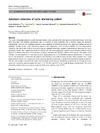Please use this identifier to cite or link to this item:
https://accedacris.ulpgc.es/jspui/handle/10553/41479
| Title: | Automatic detection of cyclic alternating pattern | Authors: | Mendonça, Fábio Fred, Ana Mostafa, Sheikh Shanawaz Morgado-Dias, Fernando Ravelo-García, Antonio G. |
UNESCO Clasification: | 120325 Diseño de sistemas sensores 3307 Tecnología electrónica |
Keywords: | Automatic classification CAP A phase |
Issue Date: | 2018 | Project: | Projeto Estratégico LA 9—UID/EEA/50009/2013 | Journal: | Neural Computing and Applications | Abstract: | The cyclic alternating pattern is a microstructure phasic event, present in the non-rapid eye movement sleep, which has been associated with multiple pathologies, and is a marker of sleep instability that is detected using the electroencephalogram. However, this technique produces a large quantity of information during a full night test, making the task of manually scoring all the cyclic alternating pattern cycles unpractical, with a high probability of miss classification. Therefore, the aim of this work is to develop and test multiple algorithms capable of automatically detecting the cyclic alternating pattern. The employed method first analyses the electroencephalogram signal to extract features that are used as inputs to a classifier that detects the activation (A phase) and quiescent (B phase) phases of this pattern. The output of the classifier was then applied to a finite state machine implementing the cyclic alternating pattern classification. A systematic review was performed to determine the features and classifiers that could be more relevant. Nine classifiers were tested using features selected by a sequential feature selection algorithm and features produced by principal component analysis. The best performance was achieved using a feed-forward neural network, producing, respectively, an average accuracy, sensitivity, specificity and area under the curve of 79, 76, 80% and 0.77 in the A and B phases classification. The cyclic alternating pattern detection accuracy, using the finite state machine, was of 79%. | URI: | https://accedacris.ulpgc.es/handle/10553/41479 | ISSN: | 0941-0643 | DOI: | 10.1007/s00521-018-3474-5 | Source: | Neural Computing and Applications [ISSN 0941-0643], 4 abril 2018 |
| Appears in Collections: | Artículos |
SCOPUSTM
Citations
29
checked on Jun 8, 2025
WEB OF SCIENCETM
Citations
34
checked on Feb 15, 2026
Page view(s)
85
checked on Jan 11, 2026
Download(s)
205
checked on Jan 11, 2026
Google ScholarTM
Check
Altmetric
Share
Export metadata
Items in accedaCRIS are protected by copyright, with all rights reserved, unless otherwise indicated.
